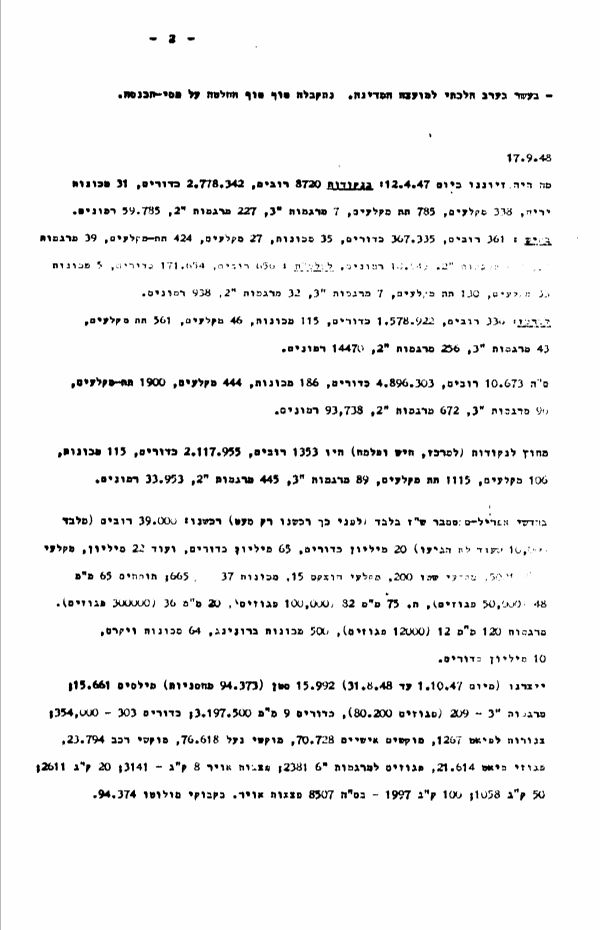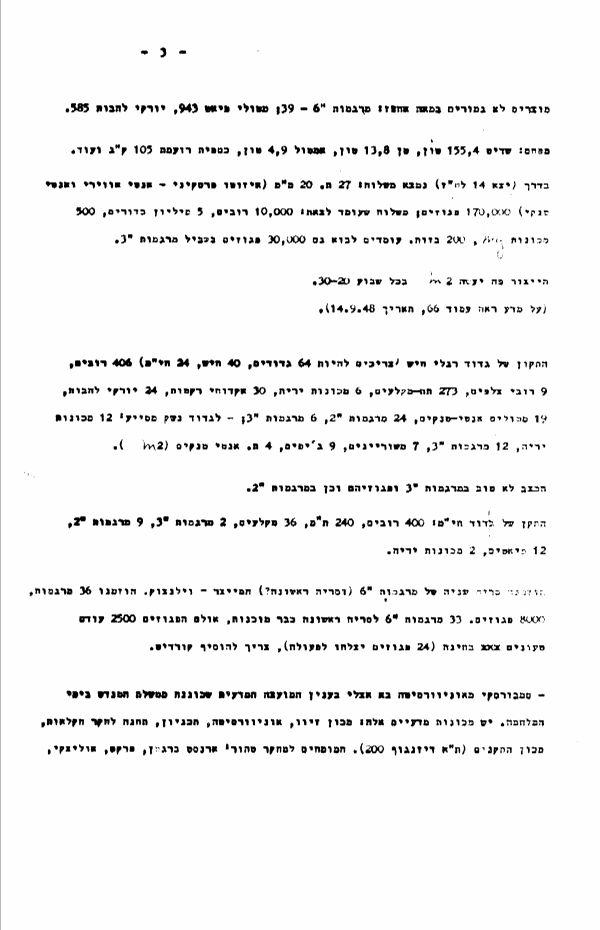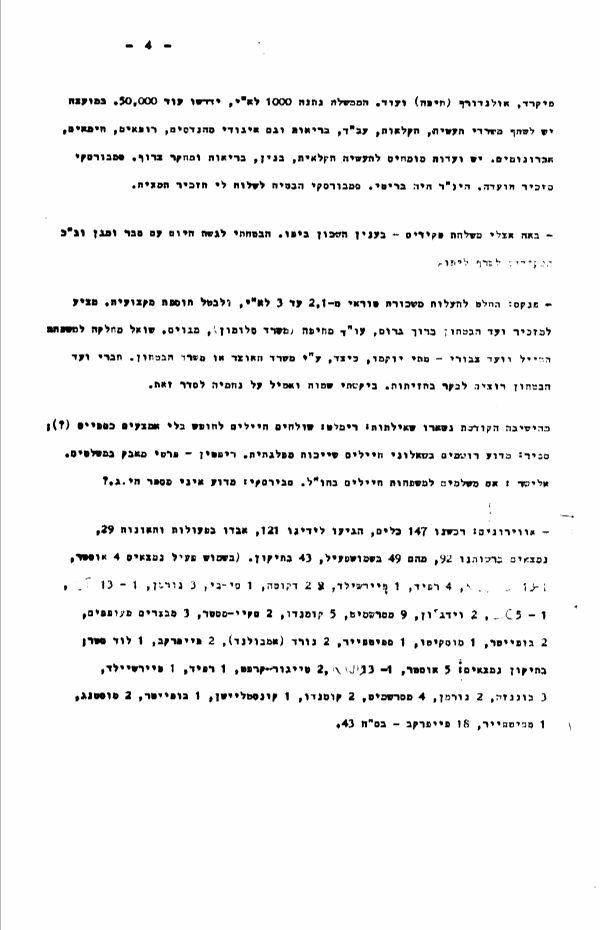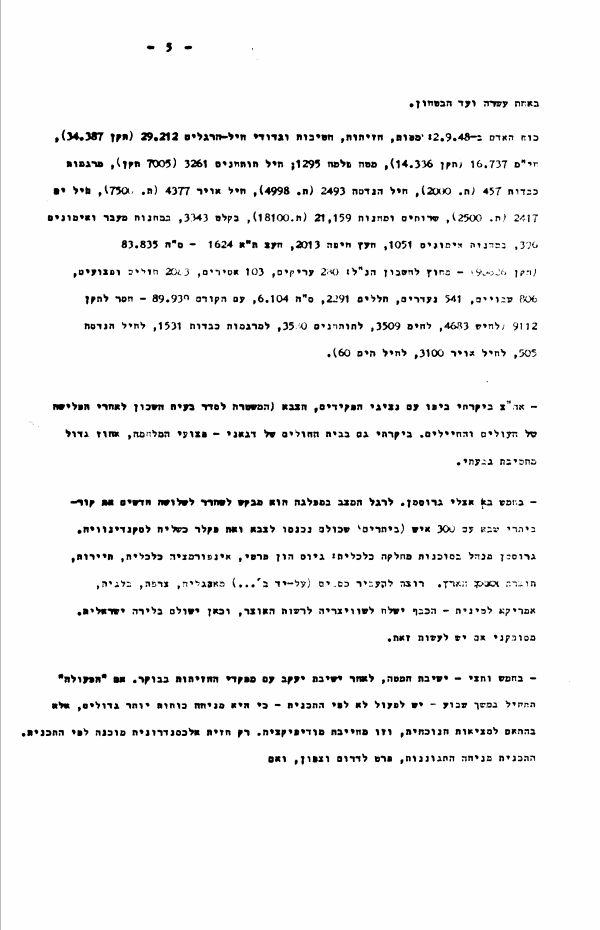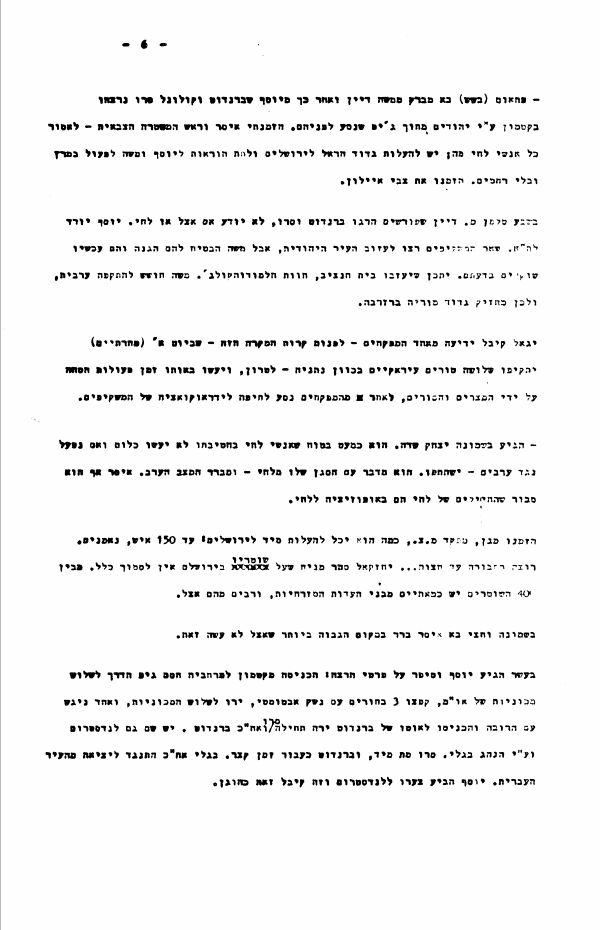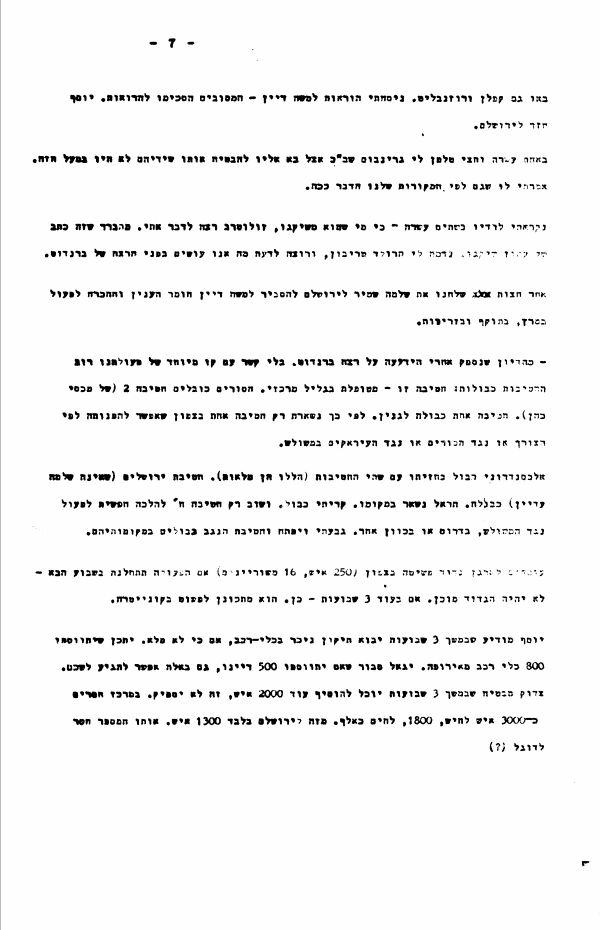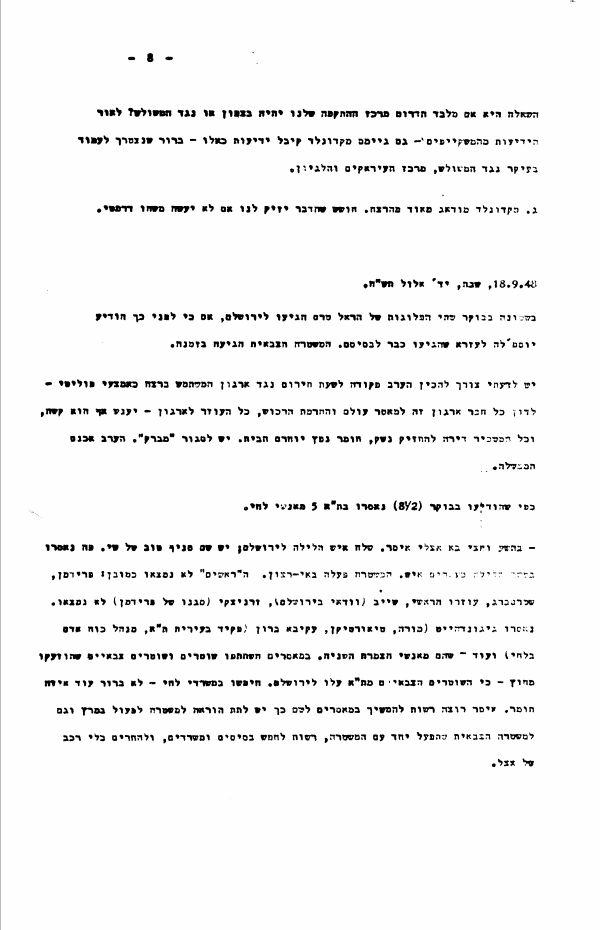1
of
Places:
England
Haifa
Jaffa
Nayn
Magen
Giv'ati
Lod
United States
Belgium
France
Barak
Switzerland
Har'el
Jerusalem
Netanya
Chicago
Shamir
Yiftah̠
Nablus
The use of the photograph is subject to the Copyright Law, 2007
16.09.1948
224858
[Friday,] September 17, 1948 The state of our armament on April 12, 1947: In the settlements 8,720 rifles, 2,778,342 bullets, 31 [heavy] machine guns, 338 [light] machine guns, 785 submachine guns, 7 3” mortars, 227 2” mortars, 59,785 grenades. In Hayish: 361 rifles, 367,335 bullets, 35 [heavy] machine [gun]s, 27 [light] machine guns, 424 submachine guns, 39 3” mortars, 157 2” mortars, 18,545 grenades. In Palmach: 656 rifles, 171,654 bullets, 5 [heavy] machine [gun]s, 33 [light] machine guns, 130 submachine guns, 7 3” mortars, 32 2” mortars, 938 grenades. In the center: 336 rifles, 1,578,922 bullets, 115 [heavy] machine [gun]s, 46 [light] machine guns, 561 submachine guns, 43 3” mortars, 256 2” mortars, 14,470 grenades. Total 10,673 rifles, 4,896,303 bullets, 186 [heavy] machine [gun]s, 444 [light] machine guns, 1,900 submachine guns, 96 3” mortars, 672 2” mortars, 93,738 grenades. Outside of the settlements (in the center, Hayish, and Palmach) there were 1,353 rifles, 2,117,955 bullets, 115 [heavy] machine [gun]s, 106 [light] machine guns, 1,115 submachine guns, 89 3” mortars, 445 2” mortars, 33,953 grenades. In the months of April-September of just this year (before that we only purchased a little) we purchased: 39,000 rifles (excluding 10,000 that have not arrived yet), 20 million bullets, 65 million bullets, and another 22 million, MG 5021 [light] machine guns, 200 Chauchat machine guns, 15 Hotchkiss machine guns, ZB-37 machine [gun]s 665; 65 mm cannons 48 (50,000 shells), 75 mm C. [cannons] 82 (100,000 shells), 20 mm 36 (300,000 shells), 120 mm mortars 12 (12,000 shells) 500 Browning machine [gun]s, 64 Vickers machine [gun]s, 10 million rounds. We produced (from October 1, 1947, to August 31, 1948) 15,992 Sten [guns] (94,373 cartridges), 15,661 Mills; 3” mortars – 209 (80,200 shells), 9 mm bullets 3,197,500; .303 bullets – 354,000; PIAT tubes 1,267, personal [anti-personnel] mines 70,728, [anti-personal blast] landmines 76,618, anti-vehicle mines 23,794, PIAT shells 21,614, 6” mortar shells 2,381; 8 kg aerial bombs – 3,141; 20 kg 2,611; 50 kg 1,058; 100 kg 1,997 – in total 8,507 aerial bombs. Molotov bottles [cocktails] 94,374. Products not 100% completed: 6” mortars – 39; PIAT launchers 943, flamethrowers 585. Chemicals facilities: cheddite 155.4 tons, TEN 13.8 tons, emythol [?] 4.9 tons, fulminating mercury 105 kg, and more. Shipment en route (departed on the 14th of this month): 27 20 mm C. (Isotta Fraschini – anti-air and anti-tank) 170,000 shells; a shipment about to depart: 10,000 rifles, 5 million bullets, 500 MG machine [gun]s, 200 Besa [machine gun]s. 30,000 shells for 3” mortars are also due to arrive. Local manufacturing will produce 20-30 M2 [?] each week. (Regarding the science, see page 66, September 14, 1948.) The standard for a Hayish [Field Corps] infantry battalion (there should be 64 battalions, 40 Hayish, 24 garrison) 406 rifles, 9 sniper rifles, 273 submachine guns, 6 [heavy] machine guns, 30 rocket launchers, 24 flamethrowers, 19 anti-tank launchers, 24 2” mortars, 6 3” mortars; – for an auxiliary weapons battalion: 12 [heavy] machine guns, 12 3” mortars, 7 armored vehicles, 9 jeeps, 4 anti-tanks C. (M2). The situation is not good with the 3” mortars and their shells, nor the 2” mortars. The standard for a garrison battalion: 400 rifles, 240 SM [submachine guns], 36 [light] machine guns, 2 3” mortars, 9 2” mortars, 12 PIATs, 2 [heavy] machine guns. A second series of 6” mortars has been ordered (and the first series?). The manufacturer – Vilenchuk. 36 mortars, 8,000 shells were ordered. 33 6” shells for the first series are already ready, but the 2,500 shells still need to be tested. Need to add cordite (24 shells will suffice for an operation). – [Prof. Shmuel] Sambursky from the university came to see me regarding the scientific council established by the Mandate government during the war. The scientific institutes are the following: Sieff Institute, University, Technion, Agricultural Research Station, the Standards Institute. Experts in pure research: Ernst [David] Bergmann, [Laszlo] Farkas, [Aryeh] Olitzki, [Yehuda] Picard, [Franz] Ollendorff (Haifa), and others. The government provided P£ 10,000, and now they requested 50,000. The council should include the ministries of industry and agriculture, PW [public works, presumably the Ministry of Labor], health, and also unions of engineers, doctors, chemists, agronomists. There are experts’ committees for agricultural industry, construction, healthcare, and pure science. Sambursky – secretary of the [Mandatory] committee. The chairman was British. Sambursky promised to send me a concise memorandum. – A delegation of officials came to see me – regarding the housing [that was invaded] in Jaffa. I promised to go to Jaffa today with [Police Commissioner] Yehezkel [Sahar], [Danny] Magen [of the Military Police], a representative of the officials, and [Ze’ev] Sherf. – Pinkas [head of the Defense Committee] decided to raise the salary of a private from P£ 2.1 to 3, and to eliminate a professional supplement [supplemental payment]. For secretary of the Defense Committee he proposes Baruch Gross, an attorney from Haifa (Salomon Law Offices), [who’s] elisted. He asks: a department for the soldier’s family and a public committee – when will they be established, how, by the Finance Ministry or the Defense Ministry. The Defense Committee members want to visit the fronts. I requested names and I’ll task Nehemiah [Argov] with arranging this. Queries that remain from the previous meeting: [Dr. Elimelekh] Rimalt: soldiers are being given time off without financial means (?); [Yosef] Sapir: why is political party affiliation being noted on soldiers’ questionnaires. [Ya’akov] Riptin – details of the struggle in the strongholds [exchanges of fire during the truce]. [Eliyahu] Elyashar: whether the families of soldiers abroad are being paid. [Moshe] Swirsky: why don’t I share information as with the yod-gimmel [“the 13” – the provisional government, whose members belonged to the People’s Administration]. – Airplanes: We purchased 147 instruments, received 121, lost 29 in actions and accidents, have 92 in our possession, of these 49 are in active use, 43 under repair. (In active use there are 4 Auster, 4 13-1 BT [?], 4 Rapid, 1 Fairchild, 2 Dakota, 1 CB [?], 3 Norman [Norseman?], 1 – RWB 13, 1 – DC-5, 2 Widgeon, 9 Messerschmitt, 5 Commando, 2 Skymaster, 3 Flying Fortresses, 2 Beaufighter, 1 Mosquito, 1 Spitfire, 2 Nord [?] (Ambuland [?]), 2 Piper Cub, 1 Lode Star; Under repair: 5 Auster, 1 – RWB13 [?], 2 Tiger-Craft [?], 1 Rapid, 1 Fairchild, 3 Bonanza, 2 Norman [Norseman?], 4 Messerschmitt, 2 Commando, 1 Constellation, 1 Beaufighter, 2 Mustang, 1 Spitfire, 18 Piper Cub – in total 43.[)] – At eleven Defense Committee. Manpower on September 2, 1948: Staff, fronts, brigades, and infantry battalions 29,212 (standard 34,387), garrison 16,737 (standard 14,336), Palmach staff 1,295; artillery corps 3,261 (standard 7,005), heavy mortars 457 (S. 2,000), engineering corps 2,493 (S. 4,998), air force 4,377 (S. 7,500), navy 2,417 (S. 2,500), services and camps 21,159 (S. 18,100), in intake 3,343, in transit and training camps 396, in training camps 1,051, MLB [military labor brigade] Haifa 2,013, MLB Tel Aviv 1,624, total 83,835 (standard 90,826) – aside from the above figures: 280 deserters, 103 prisoners, 2,083 ill and wounded, 806 POWs, 541 missing, 2,291 fallen, total 6,104, with the above 89,939 – short of the standard 9,112 (for Hayish 4,683, for garrison 3,509, for artillery 3,580, for heavy mortars 1,531, engineering corps 505, for air force 3,100, for navy 60). – In the afternoon I visited Jaffa with representatives of the officials, the army, and the police to sort out the problem of housing after the invasion by immigrants and soldiers. I also visited Dajani’s hospital – war wounded. A large percentage from the Givati Brigade. – At five [Meir] Grossman visited me. In light of the situation in the party [HATZOHAR], he’s asking for a three-month release for Shlomo Kor – a Beitari [Beitar member] who arrived with 300 Beitari [immigrants] (all of whom enlisted in the army) – and [Herman] Fekler, as an envoy to Scandinavia. Grossman heads the Economic Department in the [Jewish] Agency: raising private capital, general information, tourism, in-country production. He wants to transfer funds (by way of B…) from England, France, Belgium, Latin America – the money will be sent to Switzerland to be available for the Finance [Ministry], and here it will be paid in Israeli lira. I’m doubtful as to whether this should be done. – At 5:30 – [General] Staff meeting, following Ya’akov [Dori]’s meeting with the front commanders this morning. If the “operation” is launched over the course of [this?] week – then it should proceed not as planned, because it [the plan] presumes larger forces, but rather in accordance with the current reality, which necessitates modification. Only the Alexandroni front is ready according to the plan. The plan presumes a defensive capability, aside from the south and the north, and if [At this point the discussion and its documentation were abruptly interrupted. This portion of the diary entry continues later in the notes for this day, where indicated below.] – Suddenly (at 6) a cable arrived from Moshe Dayan, and after that from [Dov] Yosef, [stating] that Bernadotte and Colonel Serot were assassinated in Katamon by Jews in a jeep that was driving ahead of them. I summoned Isser [Harel] and the head of the military police – to apprehend all the LEHI men here; the Harel battalion should be sent to Jerusalem and [Dov] Yosef and Moshe [Dayan] should be instructed to act decisively and mercilessly. We summoned Zvi Ayalon [Central Front commander]. At 7 M. Dayan telephoned [and said] that secessionists had killed Bernadotte and Serot, not clear whether it was ETZEL or LEHI. Yosef is heading to Tel Aviv. The rest of the [UN] observers wanted to leave the Jewish city, but Moshe promised them protection and now they’re considering the matter. They might leave the commissioner’s residence, Havat HaLimud [girls’ agricultural school], and the college [in Talpiot]. Moshe is concerned about an Arab attack and is therefore keeping the Moriah Battalion as reserve. Yigael [Yadin] received a message from one of the inspectors – before this incident – that on Sunday (the day after tomorrow) three Iraqi columns will launch an attack in the direction of Netanya – Latrun, and simultaneously Egyptians and Syrians will carry out diversionary actions, and one of the inspectors traveled to Haifa to arrange the evacuation of the observers. At 8 Yitzhak Sadeh [of the 8th Brigade] arrived. He’s almost certain that the LEHI men in his brigade won’t do anything, and if we take action against the Arabs – they’ll participate. He’s speaking with his deputy from LEHI – and clarifying the situation this evening. Isser [Harel] is also certain that the LEHI soldiers are in opposition to LEHI. – We summoned [Danny] Magen, commander of the MP [Military Police]. How many can he bring to Jerusalem right away? Up to 150 men, loyal ones. He wants transport by midnight… [Police Commissioner] Yehezkel Sahar assumes that his policemen in Jerusalem cannot be relied on at all. Of the 400 policemen there are about 200 from Mizrahi [Eastern] communities, and many of them are ETZEL. At 8:30 Isser [Harel] came. He clarified at the highest level that ETZEL hadn’t done this. At 10 [Dov] Yosef arrived and gave me details about the assassination: At the passage from Katamon to Rehavia a jeep blocked the way to the three UN vehicles. 3 guys with automatic weapons jumped out, fired at the three vehicles, and one approached with a rifle and inserted it into Bernadotte’s car, shot Serot first and then Bernadotte. [General] Lundstrom was also seated there, next to the driver [Colonel] Begley. Serot died immediately, and Bernadotte soon thereafter. Begley later objected to leaving the Jewish city. Yosef expressed his condolences to Lundstrom, who accepted them respectfully. [Eliezer] Kaplan and Rosenblüth [Pinchas Rosen] also came. I formulated instructions to Moshe Dayan – the meeting’s participants approved the instructions. Yosef returned to Jerusalem. At 11:30 [Yitzhak] Gruenbaum telephoned me [to say] that an ETZEL representative came to see him to assure him that they had no hand in this deed. I told him that this is the case according to our sources as well. I was summoned to the radio at 12 – because somebody from Chicago, Zolotarev [sp.], wanted to speak with me. Turns out it’s a reporter for a Chicago newspaper, Herald Tribune I think, and he wants to know what we’re doing Bernadotte’s assassination. After midnight we sent Shlomo Shamir to Jerusalem to explain the severity of the situation to Moshe Dayan as well as the need to act boldly, forcefully, and quickly. – From the [General Staff] discussion that was suspended after the news about Bernadotte’s assassination [returning to the discussion interrupted above]: Unrelated to any special policy in our action [the planned operation against the Arabs] most of the brigades are tied up: Brigade Zayin [the 7th Brigade] – is preoccupied by the Central Galilee. The Syrians are tying up the 2nd Brigade [Carmeli] (under Maxie Kahan). One brigade [Oded] is tied up in Jenin. Thus there remains only one brigade in the north that can be directed as needed either against the Syrians or against the Iraqis in the Triangle. Alexandroni is tied up at its front with the two brigades (these are full). The Jerusalem brigade (which is not full yet) is tied up. Harel remains in place. Kiriati is tied up. And again only Brigade Het [the 8th Brigade] is free in practice to act against the Triangle, in the south, or elsewhere. Givati, Yiftah, and the Negev Brigade are tied up in their locations. A raid battalion will be organized in the north (250 men, 16 armored vehicles). If the actions start next week – the battalion won’t be ready. If in 3 weeks – it will be. He’s planning a raid on Quneitra. Yosef [Avidar] over the course of 3 weeks a significant [portion of] vehicles will be repaired, albeit not all. It’s possible that 800 vehicles will be added from Europe. Yigael [Yadin] thinks that an additional 500 will suffice, even with these [we] can reach Nablus. [Moshe] Zadok promises that over the course of 3 weeks he can add another 2,000 men. This won’t be enough. The center is short about 3,000 men: 1,800 for Hayish, about a thousand for garrison. Of this for Jerusalem alone 1,300 men [are needed?]. Ben-Gal [Kiriati] is short the same number. The question is whether aside from the south, the focus of our attack will be in the north or against the Triangle? In light of reports from the observers – James McDonald [US ambassador] also received such reports – it’s clear we’ll mainly have to confront the Triangle, where the Iraqis and the Legion are centered. – J. McDonald is very concerned about the assassination [of Bernadotte]. He’s concerned that it will harm us unless something dramatic is done.





